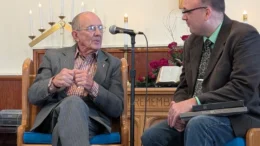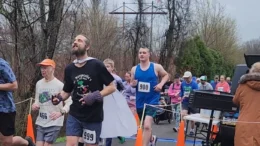A long, contentious discussion about removing the ballot drop box from near the entrance to the Courthouse Annex in Franklin ensued at a special meeting of the Venango County Elections Board on Friday.
The meeting had been originally called to address an entirely different matter — challenges to a number of voter registrations in Venango County.
A majority of the 14 people who showed up at Friday’s meeting came to express their opposition to a decision earlier this week by the county commissioners to discontinue use of the ballot drop box by the annex door for the Nov. 8 general election.
Democratic commissioner Albert Abramovic voted against removing the box.
During the public comment portion of Friday’s election board meeting, several people made clear they believed doing away with the drop box would make voting harder and that the action had decreased their confidence in the election system.
Bonnie Summers, a former Venango County commissioner, expressed her pride and confidence in the county’s election system and leadership over the years. She said she was very disappointed with the decision to remove the drop box and that she “doesn’t think this was a good leadership decision.”
Mike Wilcox of the Oil Region Rising group noted that without the drop box, people who were returning their mail-in ballots would be dependent on the postal service or going to the elections office during business hours when many people work.
Wilcox said there is a “lack of confidence in the postal service” and “it takes a week for something mailed at Cochranton to reach Franklin.” Wilcox is from Cochranton.
“Did getting rid of the drop box make voting easier? How much fraud was connected to that drop box? We’re talking about something that made it more convenient for people to vote,” said Bob Hines as he pointed out how convenient the drop box has been.
Wilcox and Veronica Santee both said that having the agenda for Tuesday’s commissioners meeting posted 24 hours in advance isn’t enough time for people to find out what will be voted on at a meeting and make plans to attend.
They called this week’s move underhanded.
Sabrina Backer, the county’s chief clerk and elections director, explained that the agenda for commissioners meetings is always posted online the day before the meeting takes place in keeping with the Sunshine Law.
“We have heard a lot of opinions on both sides of the issue and we will take the letter from the Venango County Democrats into account,” Breene said in response.
Breene was referring to a letter that has been given to the commissioners that outlines concerns the county Democrats have with removing the drop box.
Breene added that he wants to “make voting easy and cheating hard.”
After the meeting, Breene said one of his main concerns with the ballot drop box was security. Even with security cameras, the issue of a person putting multiple ballots in the box, a form of fraud, was still a concern, Breene said.
Breene said people still have three options to vote — hand in their ballot to a person in the elections office, vote in person or walk to the mailbox half a block away from the annex and mail their ballot.
Backer noted after the meeting that the drop box was used the most during the 2020 election and at it’s peak it was only used by 11% of the roughly 6,000 people who returned mail-in ballots.
Registration challenges
Meanwhile, in the other matter of interest at Friday’s election board meeting, Breene said no voter registrations were canceled as a result of the roughly 150 challenges brought before the election board.
The commissioners unanimously voted to mark 26 registrations as inactive.
Dulaney said those voters were marked as inactive because it was proved there was a change of address and the person was registered to vote in another location.
If one of those 26 people wants to vote in Venango County, they must show a valid ID to vote, Dulaney added.
Many of the other 125 voters in question were flagged as having an unconfirmed address, which means that if they go to vote they must show their ID and proof of where they live, Backer said.
County solicitor Rich Winkler read the roughly 150 names in question at the meeting as well as the names of those who filed the affidavits.
After reading the names, Winkler said what the status of each voter’s registration was (active or inactive or canceled) and what action would follow after the election.
“About four or five months ago Jeff Lehman brought to our attention that about 600 people on the Venango County voter rolls had multiple addresses listed. I think if we are doing our job, we should look into that,” Breene said.
Breene explained that there is a legal process by which a voter can challenge the registration of another voter who lives in the same municipality. He added that “it is not a simple process.”
Of those names in question, about 500 were challenged by other voters who went through the legal process and signed affidavits.
“That Jeff could, in a month, find so many people to sign their names to affidavits spoke a lot to the concerns that many people had. I hope this builds understanding in the process,” Breene said.
Lehman said he used tools provided by True The Vote to compare the Venango County voter rolls to the U.S. Postal Service’s record of people in Venango County who requested a change of address.
“It appears that these people moved away and should not be on the voting rolls in Venango County,” Lehman said. “I was very pleased to learn that about two-thirds of them the election office had already caught through their normal process and only about 150 names were in question,” Lehman added.
Backer explained that the elections office has a rigorous process in place that it uses to make sure the voter rolls are maintained, a process that is part of its daily routine. It includes things like looking at the obituaries published in the newspaper every day as well as consulting other sources at their disposal, she said.
“I want to be clear, the challenges came from a place of heart to help us, not for any other reason,” Backer said of the efforts by Lehman and a number of others.
Breene concurred.
“In every step of this process they showed nothing but good faith and wanted to help us maintain the voter rolls,” Breene said.
A voter is marked as being inactive if they haven’t voted or “engaged with the voting process,” (such as getting a new drivers license or ID card) for five years, Backer said.
At that point, the elections office sends a letter every year for four years to the last known address for that voter asking them to confirm their registration information and answer the letter, Backer said.
After a total of nine years or two federal elections have passed with no response or activity from the voter, they are removed from the rolls, Backer said. If that person wants to vote they must register again, she added.
Backer noted that there was no way for Lehman to know which voters were active or inactive when he submitted the affidavits.
For more local news, visit TheDerrick.com.









































